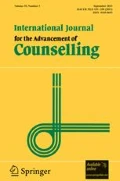Abstract
The introduction of school counseling services into traditional communities that are unfamiliar with counseling is a complex multidimensional process that involves considerable ideological tensions, disputes and obstacles... This paper considers the different trajectories of the recent development of counseling services within two distinctive minority groups in Israel-Arab and the Ultra-Orthodox Jewish communities. The dynamics of the change process for these traditional communities within the current Israeli social–political context lends support for the advancement of the international counseling community’s vision to promote human welfare and fairness as well as the healthy development of children and youth within diverse cultural contexts.
Similar content being viewed by others
References
Biglan, A., Brennan, P. A., Foster, S. L., & Holder, H. D. (2004). Helping adolescents at risk: Prevention of multiple problem behaviors. New York, NY, US: Guilford Press.
Capuzzi, D. E, & Gross, D. R. (Eds.) (2004). Youth at Risk: A Prevention Resource for Counselors, Teachers, and Parents (4th Ed.). Alexandria, VA: American Counseling Association.
Central Bureau of Statistics (2004) Driven (31 March, 2004) from http://www.cbs.gov.il.
Cohen, R. (2006). Strangers in their Homeland: Arabs, Jews, and the state of Israel. Tel-Aviv: Dyunon.
Dayan, U. (2005). The Israeli Arabs Citizens in the National situation evaluation. In Y. Reiter (Ed.), Dilemmas in Arab–Jewish Relations in Israel (pp. 44–50). Tel-Aviv: Schocken Publishing house Ltd.
Delgado, M. (2002). New frontiers for youth development in the twenty-first century: Revitalizing and broadening youth development. New York, NY, US: Columbia University Press.
Erhard, R. (1998). A National Survey of School Counselors – An Analysis of Findings. Jerusalem: The Ministry of Education and Culture, The Psychological – Counseling Services.
Gurovich, N., & Cohen-Kastro, E. (2004). Ultra-Orthodox Jews: Geographic distribution and demographic, social and economic characteristics of ultra-orthodox jewish population in Israel 1996–2001. Working Paper Series No. 5, Central Bureau of Statistics Demography Sector.
Haidar, A. (2005). The book of the Arab society in Israel: Population, society, economy. Hakibuz Hameuchad: Van-Lir Institute.
Hamiasi, R. (2005). Land, population and Arab–Jewish Relations. In Y. Reiter (Ed.), Dilemmas in Arab–Jewish relations in Israel (pp.137–147). Tel-Aviv: Schocken Publishing house Ltd.
Hirschfeld, Y. P. (2000). Oslo: A formula for peace from negotiation to implementation. Tel-Aviv: Am Oved.
Lerner, R. M., Taylor, C. S., & Von Eye, A. (2002). Pathways to positive development among diverse youth. New directions for youth development: Theory practice research. San Francisco, CA, US: Jossey-Bass.
Levy, A. (1990). The Ultra-Orthodox. Jerusalem: Keter Publishing House.
Nussbaum, M. (1999). Sex and social justice. Oxford, UK: Oxford University Press.
Okin, S. M. (1999). Is multiculturalism bad for women? Princeton, NJ: Princeton University Press.
Sivan, E., & Kaplan, C. (Eds.) (2003). The Israeli Ultra-Orthodox Jews: Their integration without assimilation?, Jerusalem: Van-Lir Institute.
Super, A. (2005). Demography and territory—central factors in Arab–Jewish relations. In Y. Reiter (Ed.), Dilemmas in Arab–Jewish relations in Israel (pp.116–136). Tel-Aviv: Schocken Publishing house Ltd.
Turiel, E. (1983). The development of social knowledge: Morality and convention. Cambridge: Cambridge University Press.
Turiel, E. (2002). The culture of morality: Social development, context, and conflict. Cambridge, UK: Cambridge University Press.
Watzlawick, P., Weakland, J., & Fisch, R. (1979). Change; principles of problem formation and problem resolution. Tel-Aviv: Sifriat Hapualim.
Author information
Authors and Affiliations
Corresponding author
Additional information
The paper is based on a Keynote address, IAC Conference: Jamaica, April 2004.
Rights and permissions
About this article
Cite this article
Erhard, R.L., Erhard-Weiss, D. The Emergence of Counseling in Traditional Cultures: Ultra-Orthodox Jewish and Arab Communities in Israel. Int J Adv Counselling 29, 149–158 (2007). https://doi.org/10.1007/s10447-007-9035-8
Received:
Accepted:
Published:
Issue Date:
DOI: https://doi.org/10.1007/s10447-007-9035-8




